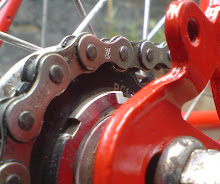Obviously, Schumacher's projections of resource depletion have not come true just yet, but many still believe that peak oil is just around the corner, with all the scary consequences it will bring. The fundamental message, that we have to live within our planetary means, still holds true.
Other projections of the future have not aged so well, particularly the predicted leisure society, where automation would mean fewer working hours and more, cheap-to-participate activities for our own time. Few people are content to work less than a full week and no-one would call the theatre, cinema or going to a football match "cheap".
So, what went wrong?
Socialists will say, no doubt, that market forces have kept wages low through competition (both in the same region and against poorer regions of the world). And they would be right. Incomes have grown when compared to some basic commodities like bread or beer, but other living expenses have kept disposable income in check. Most notably, the price of property, which homeowners were so overjoyed about until recently, has meant that the cost of accommodation is now over half of many people's income.
Social pressure has multiplied "ordinary" living expenses too. We expect to be able to buy take-away food, eat out, buy new clothes, and go out to bars, the cinema and clubs more often than we did 20, 30 or 40 years ago. In the last 40 years, the home telephone, television, video, games console, home computer, personal music player and mobile phone have all become considered as possessions for all. No wonder we need to work every hour our new-found legal limits will allow.
None of the above is exactly insighful. Yet, where would we be if we abandoned the luxuries we have grown used to? If we did the same job, lived in a modest flat, travelled infrequently, bought clothes out of necessity alone, and got our entertainment from books and the radio. We might be able to save money more effectively (or give more to charity), but what else would we achieve? Would we be any happier, or would our anachronistic lifestyle just feel like being deprived?
Perhaps this is looking at things the wrong way. The leisure society was supposed to make us happier: perhaps it's the fact that we aren't significantly more contented that is more important and interesting.
Like incomes, my guess is that people are generally more happy with what live brings than they were in, say the 50s. More room, better clothes and furniture, tastier food, and a broad choice of types of entertainment all make life more enjoyable. But like incomes, it feels like the gains are marginal and are somewhat eroded by other changes.
Most notably, couples find it increasingly difficult to live, let alone raise children, on a single income. It feels as if the cost of getting women into the workplace was a hike in the cost of child-rearing to make taking those jobs almost compulsary.
Now, bear with me if I return to the limits to working hours that I mentioned earlier. These were introduced, in the parlance of the day, to guarantee some kind of "work-life balance". Certainly, anyone who has worked a 12-hour shift pattern (worse if it alternates between days and nights), will tell you that there is no room left for a life. But way work drains you is not simply a matter of the number of hours worked. Miners and mill workers would find it hard to contemplate running or cycling in their spare time, but many read extensively and were deeply involved with trade unions and politics. After a day of intensive editing, I find it hard to choose a book or writing over the tv.
What I'm trying to say is: the same market forces that keep wages in check have also optimised the effort demanded by employees. Legendarily relaxed workplaces such as newspapers have gone. That was time and, therefore, effort that was going to waste.
We are left mentally exhausted at the end of the week, if not every day, with little appetite for leisure activities that take mental or physical effort. Even if we do sport in our spare time, or write, of join a political party, there are few of us who can get involved with running clubs, developing and promoting our writing or standing in elections.
The expression "things that are worth doing are difficult" has been in my mind lately (perhaps because Andrew Motion said something similar about poetry), but the way we have organised ourselves makes everything harder than it has to be. We're not lazy: we're just tired.
Subscribe to:
Post Comments (Atom)


No comments:
Post a Comment